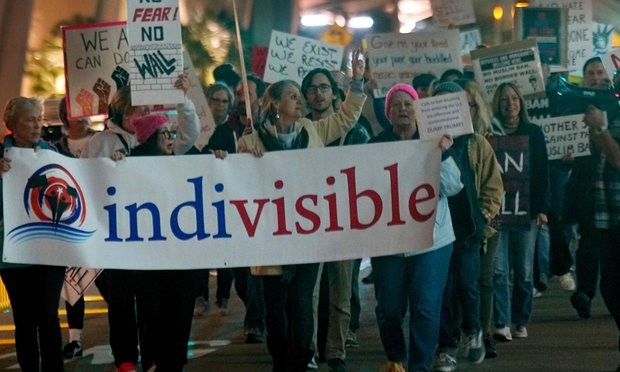
Friday March 10, 2017

After Hawaii announced its own legal action on Tuesday, Washington’s attorney general says he has a message for president: ‘Not so fast’
The state of Washington will become the second jurisdiction to challenge Donald Trump’s revised travel ban as the backlash against the president’s new order intensifies around the US.
Washington was the first state to sue Trump over the first ban in January and won a nationwide injunction that halted implementation of the order just days after it was announced.
In an indication that this challenge has become the major focal point of the continued legal resistance to Trump’s order, several other Democratic states have requested to join the lawsuit.
On Thursday, the Washington attorney general, Bob Ferguson, said he would ask a federal judge to extend the current restraining order issued against the first ban, arguing that the “core provisions” of Trump’s new ban remained “illegal and unconstitutional”.
“My message to President Trump is – not so fast,” said Ferguson in a statement. “After spending more than a month to fix a broken order that he rushed out the door, the President’s new order reinstates several of the same provisions and has the same illegal motivations as the original.”
The US justice department declined to comment, citing ongoing litigation.
Trump’s second order, a watered-down version of the first, bars visa applications from six Muslim-majority countries and places a temporary halt on America’s refugee resettlement program. In contrast to the first order, however, it contains specific exemptions for current visa holders and permanent residents, and also removes language that granted special priority for refugees from religious minorities.
Legal experts have said that while the new order may be more robust than the first, it is still vulnerable to a range of challenges.
On Tuesday, the state of Hawaii announced it would contest the new order by reviving a case it had filed against the first ban. The state argued the new ban was similarly incompatible with religious freedom provisions and would severely affect Hawaii’s economy and educational institutions.
In a newly amended complaint, the state’s case also highlights recent public comments made by members of the Trump administration who pointed to similarities between the two orders. In particular, it cites a Fox News interview in February with the president’s senior adviser Stephen Miller, known as the architect of both orders. Miller said with regards to the second order: “Fundamentally, you’re still going to have the same basic policy outcome for the country.”
A hearing is scheduled in the Hawaii case on 15 March, one day before the order is due to go into effect.
The states of New York, Massachusetts, and Oregon requested to join the case brought by the Washington attorney general. The state of Minnesota is already part of the challenge.
“Smart, aggressive litigation by state attorneys general and civil rights advocates across the country successfully torpedoed President Trump’s first Muslim Ban, and I am pleased that as state AGs, we are now marshaling our resources to fight Trump’s latest, unconstitutional decree in the Ninth Circuit,” said New York’s attorney general, Eric Schneiderman, in a statement.
Signaling that the Washington case is now the priority, Schneiderman also withdrew from a separate challenge to the first order filed in the federal court in the eastern district of New York.
The nationwide temporary restraining order against Trump’s first ban, imposed by federal judge James Robart, was upheld by the ninth circuit of appeals in February.
The Washington case contends that Trump’s ban is in violation of the US constitution’s first amendment’s equal protection clause. The claim also argues that the order is in violation of the Immigration and Nationality Act.
It cites comments made by Trump during the 2016 presidential campaign in which called for a “complete and total shutdown” of Muslims entering the US, as evidence that the ban deliberately targets a single religious group.
Once a new motion is filed, Judge Robart will have to rule on whether the temporary restraining order currently in effect can be applied to Trump’s second order.